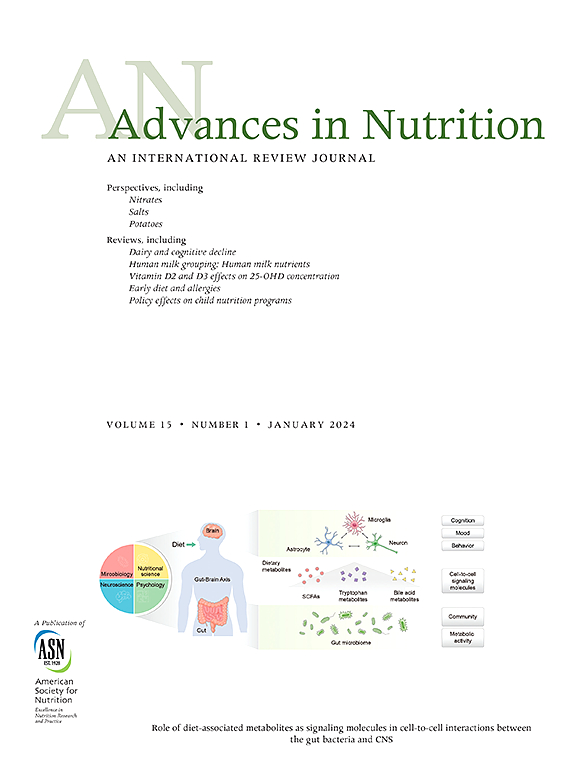Addressing Infant and Young Child Feeding Recommendations From a Planetary Health Perspective
IF 8
1区 医学
Q1 NUTRITION & DIETETICS
引用次数: 0
Abstract
Current international infant and young child (IYC) feeding recommendations consider nutrition and health but not environmental impacts. Only a handful of countries have dietary guidelines that provide quantitative recommendations for food groups of environmental concern. This study aimed to perform a narrative review of the environmental impacts of commercial milk formula compared with breastfeeding and to analyze the degree to which current country-specific IYC feeding recommendations are aligned with sustainable dietary targets. A mixed-methods review was conducted, including the following: 1) a narrative review of the environmental impact of commercial milk formula compared with breastfeeding and 2) a comparison of recommended intake of meats and dairy for children IYC based on country-specific dietary guidelines compared with the EAT–Lancet Commission dietary targets (ELCT) for children 24 mo or older and adults and if the ELCT should be adjusted for the energy needs of IYC. Formula feeding has a greater environmental impact (∼48% higher carbon footprint) than exclusive breastfeeding. Available country-specific dietary guidelines for meat and dairy products in children IYC are, in general, at or below the upper limits of the ELCT recommended ranges for older children and adults but are in most cases above the upper limit when adjusting for the energy needs of IYC. Exclusive breastfeeding should be protected and promoted not only as the healthier but also as the most sustainable alternative. Available complementary dietary feeding recommendations of nonprocessed meat and dairy fall below current ELCT for older children and adults. Given that IYC require a more nutrient-dense diet than older children and adults and considering the small quantities they consume, we recommend using the unadjusted ELCT as reference for IYC feeding while specific international consumption recommendations are developed for this age group.
从地球健康的角度提出婴幼儿喂养建议。
当前国际婴幼儿(IYC)喂养建议考虑了营养和健康,但没有考虑环境影响。只有少数几个国家的膳食指南对环境问题食品类别提出了量化建议:对商业配方奶粉与母乳喂养对环境的影响进行叙述性综述,并分析目前各国的国际幼儿保育喂养建议在多大程度上与可持续膳食目标保持一致:方法:采用混合方法进行回顾,包括:a) 对商业配方奶粉与母乳喂养对环境的影响进行叙述性回顾;b) 比较根据各国膳食指南推荐的国际幼儿中心儿童肉类和乳制品摄入量与针对 24 个月或以上儿童和成人的 "吃-胰委员会 "膳食目标(ELCT),以及是否应根据国际幼儿中心的能量需求对 "吃-胰委员会 "膳食目标进行调整:结果:与纯母乳喂养相比,配方奶喂养对环境的影响更大(碳足迹高出 48%)。各国现有的针对国际幼儿中心儿童的肉类和乳制品膳食指南一般处于或低于 ELCT 推荐的较大儿童和成人膳食范围的上限,但在根据国际幼儿中心的能量需求进行调整后,大多数情况下高于上限:结论:纯母乳喂养不仅是更健康的选择,也是最可持续的选择,因此应得到保护和推广。现有的非加工肉类和乳制品补充膳食喂养建议低于目前针对年长儿童和成人的 ELCT。鉴于幼儿和儿童需要比年龄较大的儿童和成人摄入营养密度更高的膳食,同时考虑到他们的摄入量较小,我们建议在国际上为这一年龄组制定具体的消费建议时,使用未经调整的 ELCT 作为幼儿和儿童喂养的参考。
本文章由计算机程序翻译,如有差异,请以英文原文为准。
求助全文
约1分钟内获得全文
求助全文
来源期刊

Advances in Nutrition
医学-营养学
CiteScore
17.40
自引率
2.20%
发文量
117
审稿时长
56 days
期刊介绍:
Advances in Nutrition (AN/Adv Nutr) publishes focused reviews on pivotal findings and recent research across all domains relevant to nutritional scientists and biomedical researchers. This encompasses nutrition-related research spanning biochemical, molecular, and genetic studies using experimental animal models, domestic animals, and human subjects. The journal also emphasizes clinical nutrition, epidemiology and public health, and nutrition education. Review articles concentrate on recent progress rather than broad historical developments.
In addition to review articles, AN includes Perspectives, Letters to the Editor, and supplements. Supplement proposals require pre-approval by the editor before submission. The journal features reports and position papers from the American Society for Nutrition, summaries of major government and foundation reports, and Nutrient Information briefs providing crucial details about dietary requirements, food sources, deficiencies, and other essential nutrient information. All submissions with scientific content undergo peer review by the Editors or their designees prior to acceptance for publication.
 求助内容:
求助内容: 应助结果提醒方式:
应助结果提醒方式:


